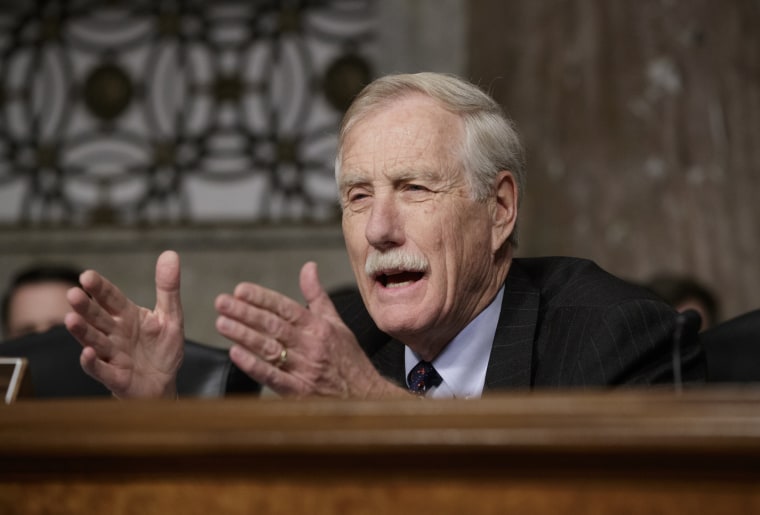It was around this time four years ago when 31 Senate Democrats signed a joint, bipartisan statement in support of preserving the legislative filibuster for the indefinite future. A lot can happen over the course of four years, though.
As regular readers know, as Republican abuses became even more common, and the Senate stopped functioning as a meaningful governing institution, many of the Democratic signatories to that 2017 joint statement started rethinking their position. In recent months, for example, Sens. Cory Booker (D-N.J.), Amy Klobuchar (D-Minn.), Bob Casey (D-Pa.), Sherrod Brown (D-Ohio), Ed Markey (D-Mass.), Tim Kaine (D-Va.), Mark Warner (D-Va.) and Martin Heinrich (D-N.M.) have all changed their minds about the chamber's status quo.
They were joined yesterday by Sen. Angus King of Maine -- an independent who caucuses with Democrats -- who made his case in an interesting op-ed. He seemed especially interested in the issue of voting rights.
I should mention that I believe voting rights are a special case that we must address in light of the nakedly partisan voter-suppression legislation pending in many states. All-out opposition to reasonable voting rights protections cannot be enabled by the filibuster; if forced to choose between a Senate rule and democracy itself, I know where I will come down.
More broadly, King added that ongoing filibuster abuses make it "harder and harder to justify" the rule's existence. The Maine independent added that if Mitch McConnell and his party continue to refuse to compromise and govern, "the necessity — and likelihood — of filibuster reform would only increase."
This comes on the heels of Sen. Dianne Feinstein (D-Calif.), a longtime reform skeptic and another signatory to the 2017 letter, also opened the door. "I don't want to turn away from Senate traditions," Feinstein said last week, "but I also don't believe one party should be able to prevent votes on important bills by abusing the filibuster."
To re-emphasize a point we've discussed before, it's important to note that while these Democratic senators are walking away from the position they took a few years, the details matter -- and they don't necessarily all agree with one another on the specific next steps. Some are on board with scrapping the filibuster altogether; others are eyeing more modest reforms of the institution's rules.
But they all agree on the underlying point: the status quo is untenable.
As for the White House, President Joe Biden last week offered public support for a proposed reform to the filibuster rules, and Axios reported today, "People close to Biden tell us he's feeling bullish on what he can accomplish, and is fully prepared to support the dashing of the Senate's filibuster rule to allow Democrats to pass voting rights and other trophy legislation for his party."
As the obstructionist tool runs out of Democratic friends, Senate Minority Leader Mitch McConnell (R-Ky.) appears increasingly rattled by reformers' momentum, yesterday warning of a "nuclear winter" in the chamber, which would create a Senate that is "not a sustainable place."
The GOP leader used similar rhetoric last week, declaring, "Let me say this very clearly for all 99 of my colleagues: Nobody serving in this chamber can even begin — can even begin to imagine — what a completely scorched-earth Senate would look like." McConnell added that the partisan gridlock of the Trump and Obama eras would look like "child's play" compared to what he would unleash if Democrats returned the Senate to a majority-rule institution.
Every time reformers pick up a new Senate ally, McConnell's anxiety level seems to reach a new level.
